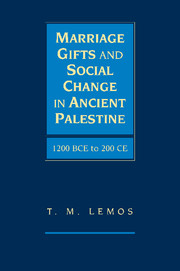Book contents
- Frontmatter
- Contents
- Acknowledgments
- Abbreviations
- Introduction
- 1 Biblical Evidence for Marriage Gifts
- 2 Postexilic Evidence for Marriage Gifts
- 3 Anthropology and the Study of Marriage Gifts
- 4 The Social Structure of Ancient Israel from Iron I to the Babylonian Exile
- 5 The Social Structure of Palestine in the Second Temple Period
- Final Analysis and Conclusions
- Appendix: Marriage Gifts Among Judeans Living in Babylonia During the Sixth Century BCE
- Glossary
- Bibliography
- Index of Biblical and Other Ancient Sources
- General Index
3 - Anthropology and the Study of Marriage Gifts
Published online by Cambridge University Press: 04 August 2010
- Frontmatter
- Contents
- Acknowledgments
- Abbreviations
- Introduction
- 1 Biblical Evidence for Marriage Gifts
- 2 Postexilic Evidence for Marriage Gifts
- 3 Anthropology and the Study of Marriage Gifts
- 4 The Social Structure of Ancient Israel from Iron I to the Babylonian Exile
- 5 The Social Structure of Palestine in the Second Temple Period
- Final Analysis and Conclusions
- Appendix: Marriage Gifts Among Judeans Living in Babylonia During the Sixth Century BCE
- Glossary
- Bibliography
- Index of Biblical and Other Ancient Sources
- General Index
Summary
INTRODUCTION
In the Introduction to this book, I provided brief, but widely agreed upon definitions of bridewealth, dowry, and indirect dowry in order to make possible the taxonomic discussions of Chapters 1 and 2. It is now appropriate and necessary to address not just what such marriage gifts are in a very strict sense, but what they do – that is, why societies even bother giving such prestations to begin with. Only by answering the latter question can one explicate the shifting emphasis from bridewealth, the most commonly mentioned prestation in preexilic sources, to dowry, the marriage gift that was unquestionably predominant in the postexilic period. Since the inception of anthropology as a discipline, ethnographers and other anthropologists have devoted much energy to the study of marriage and kinship, and in doing so have quite often discussed and interpreted the gifts surrounding marriage. In fact, no other discipline has generated so much analysis of these gifts, and so it is not only fitting but productive to look to anthropology in order better to understand the changes in marriage gifts in ancient Palestine.
Unsurprisingly, anthropologists have approached the study of marriage gifts from very different perspectives, both methodological and otherwise. For example, while some have approached marriage gifts within the wider context of ritualized gift-giving, many if not most others have examined such gifts within the context of marriage, and through that lens, of kinship and social alliances.
- Type
- Chapter
- Information
- Marriage Gifts and Social Change in Ancient Palestine1200 BCE to 200 CE, pp. 89 - 158Publisher: Cambridge University PressPrint publication year: 2010

